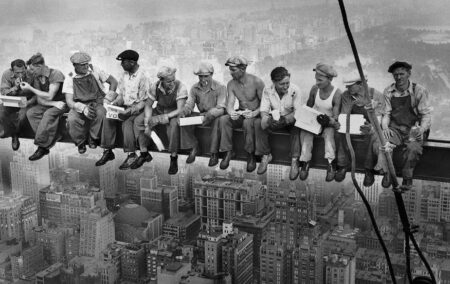Few Americans have passports, overseas trading is a small portion of their economy, and US culture is inward facing. Perhaps such isolation encourages Americans to pioneer new paths.
The country most geographically distant from a top-three economy is SA, and among the forty largest economies, SA is easily the most isolated. A feature common among high-growth economies is adding much value to goods and services consumed in high-income markets. Only a sliver of SA’s workforce adds value to exports. This traces to the ANC prioritising patronage at growth’s expense.
As global shifts challenge core considerations, citizens of both countries are reassessing how norms have recently evolved. That both SA and the US are relatively invulnerable to peer pressure probably contributes to the decline of relations between the two nations as the world begins a new era. US openness to innovation is being tested in a political context whereas SA’s controversial foreign policy alignments are triggering repercussions.
Layers
Demanding that the US respect SA’s sovereignty implies that the US is bullying. Neither Republicans nor Democrats want to offer beneficial trading terms to countries whose policies and practices are detrimental to US interests. Not respecting this position suggests a sense of entitlement.
Besides, SA’s sovereignty is not vested in our president, government or parliament. Our Constitution ties sovereignty to “regular elections” and “the will of the people”.
The ANC lost its electoral majority and surveys identify jobs as voters’ top concern. Yet the ANC’s preferred international partners aren’t going to create jobs in SA. What they share with the ANC is little regard for their citizens and contempt for the West.
South Africans don’t share the ANC’s enthusiasm for Iran and Hamas or the party’s animosity toward most Western nations. Nor do more than about 25% of Iranians support their being ruled by the ayatollahs − and Gazans have recently begun to protest against Hamas.
Legitimate
Prominent ANC personalities routinely insist that their party is highly legitimate. As former ambassador Rasool recently asserted, “I went to represent a moral superpower in a world that has lost its moral anchor.”
Rasool lost sight of his responsibility to represent our government, but if President Ramaphosa was focused on SA citizens’ top priority, jobs, he wouldn’t have chosen a Hamas sympathiser to represent SA in Washington.
Under Presidents Mandela and Mbeki, inclusive growth and workplace diversity flourished. Then, through excessively prioritising BEE and localisation policies, the ANC’s version of diversity, equity and inclusion, SA entrenched the world’s most severe youth unemployment crisis. As a direct consequence, a majority of the roughly ten million “born free” black South Africans who have left school are facing perpetual poverty. And, consistent with DEI’s leading advocates in the US, ANC elites live lavish lives.
During Jacob Zuma’s presidency, emerging norms and values were hijacked to create a resource-hungry patronage network. This parallels Hamas taking development aid to build tunnels. Most Gazans now realise that their path to prosperity begins with sidelining Hamas. Similarly, most South Africans now appreciate that the ANC serves its well-fed bosses who show so little genuine concern for the grim life-prospects of average citizens.
Shifts
The post-Cold War era began with the demise of the Soviet Union but the gathering of global leaders to celebrate the new world order happened three years later at Nelson Mandela’s presidential inauguration. Progressive ideals remained ascendant until Russia launched a full-scale invasion of Ukraine in early 2022.
The re-election of US President Trump benefited from three decades of progressive positions becoming increasingly overindulged. Most Americans are not ok with biological men competing in women’s sports or allowing minors access to puberty blockers without parental involvement.
DEI epitomises progressive overreach in that, as there is broad support for diversity and inclusion, equity could be sandwiched between them. But believing regulatory zeal can deliver equal outcomes is unaffordably delusional. As societies value some abilities more than others and abilities vary among individuals, incomes, along with so many other outcomes, will vary.
Lacking a fear of heights suddenly became much more valued when technology evolved to build skyscrapers. As the industrial era gave way to the information age, physical endurance lost ground to mental dexterity. AI will be no less disruptive.
JPMorgan, the world’s most valued bank, recently modified its DEI policies in favour of DOI. “Opportunity” displaced “equity”.
Societies would more readily reject the pursuit of equitable outcomes if voters were more realistic. And if some narrow political interests weren’t so well served. Americans with degrees in subjects like gender studies can be expected to vote Democrat because Republicans want to eliminate positions designed to undermine the importance of merit.
The volume of “diversity” and “inclusion” that best advances business interests will vary − particularly as such progress gains momentum. Conversely, “equity” was generally unhelpful and frequently overindulged in the US, much like BEE has been here. Challenging such abuses kept getting harder in the US but then pro-Hamas protests after 7 October 2023, followed by Trump’s re-election, swung much momentum in the opposite direction.
Our two pivotal political developments have been the ANC barely capturing 40% of the May vote and how the current budget impasse further undermines the ANC patronage-focused electoral strategy. Having to cut large numbers of civil service jobs would spotlight the ANC’s decline.
World leaders and ordinary South African voters know the ANC has prioritised power and patronage at the expense of citizen interests. What remains unknown, but seems increasingly unlikely, is whether the party can abandon its illegitimate virtue signalling to adopt pro-growth, pro-employment policies.
[Image: Ironworkers eating lunch on a steel beam during the construction of the RCA Building at Rockefeller Center. https://picryl.com/media/lunch-atop-a-skyscraper-457154]
The views of the writer are not necessarily the views of the Daily Friend or the IRR.
If you like what you have just read, support the Daily Friend

